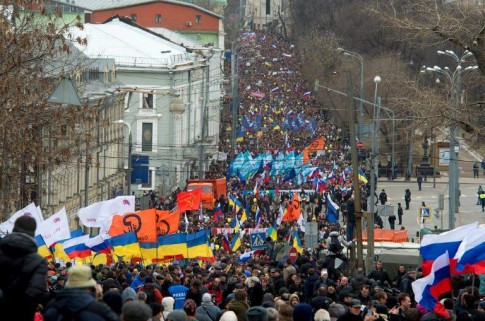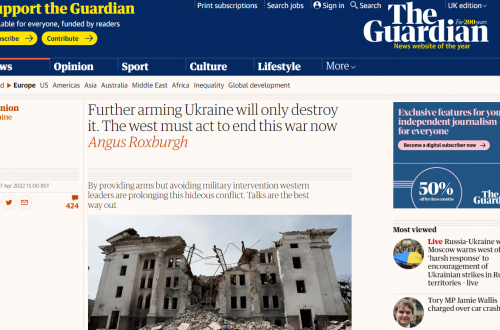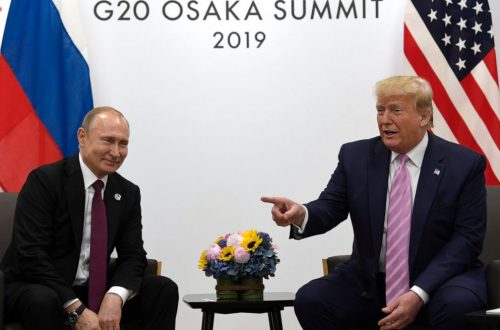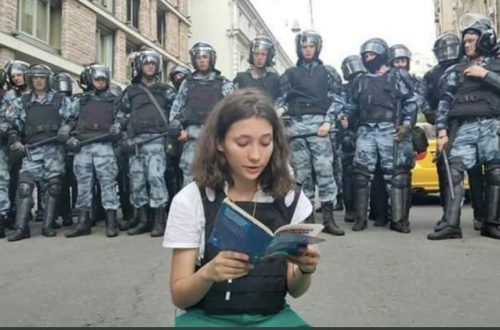Liberal commentator Jonathan Chait at New York magazine has some appropriate observations about the truly strange nature of Vladimir Putin’s leftwing American dupes.
A tragically large number of left-wing Westerners in the 20th century deluded themselves about the horrors of Soviet communism. As awful and unforgivable as it was, the process by which they made themselves into dupes was at least explicable: They loved socialism, and one country in the world was implementing socialism, so they persuaded themselves, and for a while, it was working.
Today’s Russia dupes are a smaller, more pathetic lot. Above all they are just plain weirder, because they lack a clear ideological motive for their stoogery. Soviet Russia not only commanded a vast propaganda network, but embodied a doctrine with international appeal (and which had originated outside of Russia). Vladimir Putin’s Russia follows no model except Russian nationalism. To the extent it employs a non-nationalist philosophy, its main idea is that gays have weakened Europe. And yet the dupes still come.
The most prominent intellectual apologist for Putin is Stephen F. Cohen, Princeton professor, Russologist for the left-wing Nation. Cohen is a septuagenarian, old-school leftist who has carried on the mental habits of decades of anti-anti-communism seamlessly into a new career of anti-anti-Putinism. The Cohen method is to pick away at every indictment of the Russian regime without directly associating himself with its various atrocities. Is Putin persecuting gays? Well, Cohen wants us to know that various Ukrainians nationalists dislike gays, too. And also Barack Obama’s claim to snub Sochi because of gay rights is probably not on the level. Is Putin bullying and killing journalists? Eh, says Cohen, “Every time a journalist breaks a leg, they say the Kremlin did it.” Accidents happen.
The primary hub of Russian propaganda in the West is Russia Today, an English-language Kremlin-funded propaganda outlet. Joe Pompeo reported last fall how RT has actually acquired a devoted following in the West, in part through relentless viral YouTube sharing of its reports. Cohen, of course, appears regularly on RT. (Is RT biased? Well, he says, so is CNN: “I’m highly suspicious about the narrative I’m getting on CNN. It seems to be the flip side of RT.”)
…..
Rosie Gray has a deeply reported piece on the cadre of young American journalists. Their motives appear to be a mix of careerism, naïveté, and utter incuriousity. The modal career arc of an American RT reporter appears to be an ambitious but not terribly bright 20-something aspiring journalist who, faced with the alternative of grim local-news reportage, leaps at the chance to make two or three times the pay while covering world affairs, sort of. It’s the sort of reward that dims one’s incentive to perform due diligence into just who is signing your paycheck, and why…
But the central appeal of RT is to leftists, libertarians, conspiracy theorists, and other marginalized groups. The main thematic work of RT is to paint the West in the worst possible light, as decadent, corrupt, and failing – the Cohen method of defense-by-implication…
The demise of communism has left a void in the place where socialist fervor once animated the Soviet dupes. In the absence of any positive motivating force, Putin’s Russia, which has positioned itself as America’s main rival, has sponged up whatever motley collection of outsiders it can find. Russia is not the vessel for their ideological fantasies, but merely a placeholder for their accumulated discontent.
Meanwhile in Moscow, tens of thousands of brave Russians turned out to demonstrate against Putin’s aggression in Crimea.

Head Stopper Lindsey German recently observed:
The job of any anti-war movement is to oppose its own government’s role in these wars, and to explain what that government and its allies are up to.
By that standard I would imagine the Stop the War Coalition will stand in outspoken solidarity with the Russian demonstrators. I look forward to a full report on the STWC website.
Update: And on the other end of the political spectrum (sort of), former Texas Republican congressman and presidential candidate Ron Paul blames the Crimea crisis on the US and says sanctions against Russia are “an act of war.”
“The evidence is pretty clear that the NGOs [non-governmental organisations] financed by our government have been agitating with billions of dollars, trying to get that government changed,” he said. “Our hands are not clean.”
Paul’s son, Kentucky Senator Rand Paul, is widely expected to seek the Republican presidential nomination in 2016. If he does, I imagine he’ll spend at least half of his time trying to disassociate himself from his father’s views– though in many ways they aren’t vastly different from his own.
Rand Paul has been more critical of Russia, but he opposed an aid package for Ukraine overwhelmingly approved by the Senate Foreign Relations Committee.


